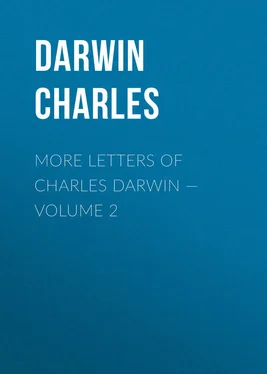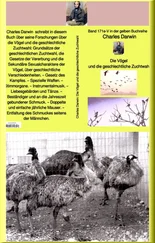Charles Darwin - More Letters of Charles Darwin — Volume 2
Здесь есть возможность читать онлайн «Charles Darwin - More Letters of Charles Darwin — Volume 2» — ознакомительный отрывок электронной книги совершенно бесплатно, а после прочтения отрывка купить полную версию. В некоторых случаях можно слушать аудио, скачать через торрент в формате fb2 и присутствует краткое содержание. Жанр: foreign_antique, foreign_prose, на английском языке. Описание произведения, (предисловие) а так же отзывы посетителей доступны на портале библиотеки ЛибКат.
- Название:More Letters of Charles Darwin — Volume 2
- Автор:
- Жанр:
- Год:неизвестен
- ISBN:нет данных
- Рейтинг книги:5 / 5. Голосов: 1
-
Избранное:Добавить в избранное
- Отзывы:
-
Ваша оценка:
- 100
- 1
- 2
- 3
- 4
- 5
More Letters of Charles Darwin — Volume 2: краткое содержание, описание и аннотация
Предлагаем к чтению аннотацию, описание, краткое содержание или предисловие (зависит от того, что написал сам автор книги «More Letters of Charles Darwin — Volume 2»). Если вы не нашли необходимую информацию о книге — напишите в комментариях, мы постараемся отыскать её.
More Letters of Charles Darwin — Volume 2 — читать онлайн ознакомительный отрывок
Ниже представлен текст книги, разбитый по страницам. Система сохранения места последней прочитанной страницы, позволяет с удобством читать онлайн бесплатно книгу «More Letters of Charles Darwin — Volume 2», без необходимости каждый раз заново искать на чём Вы остановились. Поставьте закладку, и сможете в любой момент перейти на страницу, на которой закончили чтение.
Интервал:
Закладка:
LETTER 459. TO GEORGE FRASER.
(459/1. The following letter refers to two letters to Mr. Darwin, in which Mr. Fraser pointed out that illustrations of the theory of Sexual Selection might be found amongst British butterflies and moths. Mr. Fraser, in explanation of the letters, writes: "As an altogether unknown and far from experienced naturalist, I feared to send my letters for publication without, in the first place, obtaining Mr. Darwin's approval." The information was published in "Nature," Volume III., April 20th, 1871, page 489. The article was referred to in the second edition of the "Descent of Man" (1874), pages 312, 316, 319. Mr. Fraser adds: "This is only another illustration of Mr. Darwin's great conscientiousness in acknowledging suggestions received by him from the most humble sources." (Letter from Mr. Fraser to F. Darwin, March 21, 1888.)
Down, April 14th {1871}.
I am very much obliged for your letter and the interesting facts which it contains, and which are new to me. But I am at present so much engaged with other subjects that I cannot fully consider them; and, even if I had time, I do not suppose that I should have anything to say worth printing in a scientific journal. It would obviously be absurd in me to allow a mere note of thanks from me to be printed. Whenever I have to bring out a corrected edition of my book I will well consider your remarks (which I hope that you will send to "Nature"), but the difficulty will be that my friends tell me that I have already introduced too many facts, and that I ought to prune rather than to introduce more.
LETTER 460. TO E.S. MORSE. Down, December 3rd, 1871.
I am much obliged to you for having sent me your two interesting papers, and for the kind writing on the cover. I am very glad to have my error corrected about the protective colouring of shells. (460/1. "On Adaptive Coloration of the Mollusca," "Boston Society of Natural History Proc." Volume XIV., April 5th, 1871. Mr. Morse quotes from the "Descent of Man," I., page 316, a passage to the effect that the colours of the mollusca do not in general appear to be protective. Mr. Morse goes on to give instances of protective coloration.) It is no excuse for my broad statement, but I had in my mind the species which are brightly or beautifully coloured, and I can as yet hardly think that the colouring in such cases is protective.
LETTER 461. TO AUG. WEISMANN. Down, February 29th, 1872.
I am rejoiced to hear that your eyesight is somewhat better; but I fear that work with the microscope is still out of your power. I have often thought with sincere sympathy how much you must have suffered from your grand line of embryological research having been stopped. It was very good of you to use your eyes in writing to me. I have just received your essay (461/1. "Ueber der Einfluss der Isolirung auf die Artbildung": Leipzig, 1872.); but as I am now staying in London for the sake of rest, and as German is at all times very difficult to me, I shall not be able to read your essay for some little time. I am, however, very curious to learn what you have to say on isolation and on periods of variation. I thought much about isolation when I wrote in Chapter IV. on the circumstances favourable to Natural Selection. No doubt there remains an immense deal of work to do on "Artbildung." I have only opened a path for others to enter, and in the course of time to make a broad and clear high-road. I am especially glad that you are turning your attention to sexual selection. I have in this country hardly found any naturalists who agree with me on this subject, even to a moderate extent. They think it absurd that a female bird should be able to appreciate the splendid plumage of the male; but it would take much to persuade me that the peacock does not spread his gorgeous tail in the presence of the female in order to fascinate or excite her. The case, no doubt, is much more difficult with insects. I fear that you will find it difficult to experiment on diurnal lepidoptera in confinement, for I have never heard of any of these breeding in this state. (461/2. We are indebted to Mr. Bateson for the following note: "This belief does not seem to be well founded, for since Darwin's time several species of Rhopalocera (e.g. Pieris, Pararge, Caenonympha) have been successfully bred in confinement without any special difficulty; and by the use of large cages members even of strong-flying genera, such as Vanessa, have been induced to breed.") I was extremely pleased at hearing from Fritz Muller that he liked my chapter on lepidoptera in the "Descent of Man" more than any other part, excepting the chapter on morals.
LETTER 462. TO H. MULLER. Down {May, 1872}.
I have now read with the greatest interest your essay, which contains a vast amount of matter quite new to me. (462/1. "Anwendung der Darwin'schen Lehre auf Bienen," "Verhandl. d. naturhist. Vereins fur preuss. Rheinld. u. Westf." 1872. References to Muller's paper occur in the second edition of the "Descent of Man.") I really have no criticisms or suggestions to offer. The perfection of the gradation in the character of bees, especially in such important parts as the mouth-organs, was altogether unknown to me. You bring out all such facts very clearly by your comparison with the corresponding organs in the allied hymenoptera. How very curious is the case of bees and wasps having acquired, independently of inheritance from a common source, the habit of building hexagonal cells and of producing sterile workers! But I have been most interested by your discussion on secondary sexual differences; I do not suppose so full an account of such differences in any other group of animals has ever been published. It delights me to find that we have independently arrived at almost exactly the same conclusion with respect to the more important points deserving investigation in relation to sexual selection. For instance, the relative number of the two sexes, the earlier emergence of the males, the laws of inheritance, etc. What an admirable illustration you give of the transference of characters acquired by one sex — namely, that of the male of Bombus possessing the pollen-collecting apparatus. Many of your facts about the differences between male and female bees are surprisingly parallel with those which occur with birds. The reading your essay has given me great confidence in the efficacy of sexual selection, and I wanted some encouragement, as extremely few naturalists in England seem inclined to believe in it. I am, however, glad to find that Prof. Weismann has some faith in this principle.
The males of Bombus follow one remarkable habit, which I think it would interest you to investigate this coming summer, and no one could do it better than you. (462/2. Mr. Darwin's observations on this curious subject were sent to Hermann Muller, and after his death were translated and published in Krause's "Gesammelte kleinere Schriften von Charles Darwin," 1887, page 84. The male bees had certain regular lines of flight at Down, as from the end of the kitchen garden to the corner of the "sand-walk," and certain regular "buzzing places" where they stopped on the wing for a moment or two. Mr. Darwin's children remember vividly the pleasure of helping in the investigation of this habit.) I have therefore enclosed a briefly and roughly drawn-up account of this habit. Should you succeed in making any observations on this subject, and if you would like to use in any way my MS. you are perfectly welcome. I could, should you hereafter wish to make any use of the facts, give them in rather fuller detail; but I think that I have given enough.
I hope that you may long have health, leisure, and inclination to do much more work as excellent as your recent essay.
2. VIII.III. EXPRESSION, 1868-1874.
LETTER 463. TO F. MULLER. Down, January 30th {1868}.
I am very much obliged for your answers, though few in number (October 5th), about expression. I was especially glad to hear about shrugging the shoulders. You say that an old negro woman, when expressing astonishment, wonderfully resembled a Cebus when astonished; but are you sure that the Cebus opened its mouth? I ask because the Chimpanzee does not open its mouth when astonished, or when listening. (463/1. Darwin in the "Expression of the Emotions," adheres to this statement as being true of monkeys in general.) Please have the kindness to remember that I am very anxious to know whether any monkey, when screaming violently, partially or wholly closes its eyes.
Читать дальшеИнтервал:
Закладка:
Похожие книги на «More Letters of Charles Darwin — Volume 2»
Представляем Вашему вниманию похожие книги на «More Letters of Charles Darwin — Volume 2» списком для выбора. Мы отобрали схожую по названию и смыслу литературу в надежде предоставить читателям больше вариантов отыскать новые, интересные, ещё непрочитанные произведения.
Обсуждение, отзывы о книге «More Letters of Charles Darwin — Volume 2» и просто собственные мнения читателей. Оставьте ваши комментарии, напишите, что Вы думаете о произведении, его смысле или главных героях. Укажите что конкретно понравилось, а что нет, и почему Вы так считаете.












